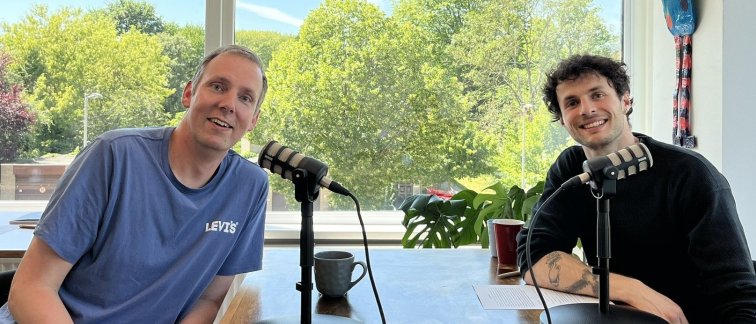In a world where our smartphones and wearables are gathering overwhelming amounts of data, how can we make use of them to better understand our health? This question is explored by APH researcher Mark Hoogendoorn, professor of artificial intelligence at the Vrije Universiteit Amsterdam. In this podcast, we explore the role of Artificial Intelligence (AI) and Machine Learning (ML) in the health setting and stress research.
In the episode titled ‘Behind the scenes of AI and Machine Learning in the health setting with Mark Hoogendoorn’ , we explore how artificial intelligence and machine learning are transforming health research and practice. By analysing information from, for example, electronic patient records, AI can uncover patterns that go beyond what humans can perceive. Mark explains: “Not to replace the health expert, but to help the health expert to treat patients or its prevention better.”
In mental health, machine learning focuses more on prediction than explanation due to complex causality. While acknowledging the hype, Mark highlights AI’s ability to handle vast and intricate datasets. Mark discusses how this analytical method can be used in healthcare and the challenges that come with all this data (e.g., noisiness, explainability).
We also discuss the data derived from wearables. First Mark reflects on wearables used by consumers. When talking about personal data tracking, Mark stresses that valuable insights canemergeeven without self-quantification. Secondly we discuss wearables in the research setting. In the Stress in Action-project we are validating various consumer and research-grade wearables. As research moves from labs to real-world settings, AI becomes crucial for interpreting richer but noisier data, paving the way for more personalised and effective stress science.
Stress in Action – about the project
Stress in Action is a research project where seven Dutch universities and UMC's collaborate in a 10-year research project on stress. Stress is complex and multifaceted, and we all experience it in our daily lives. Using novel measurement technologies and analyses, the consortium aims to measure the emotional, cognitive, biological and behavioural stress responses.
Stress in Action received the Gravitation Grant of the Dutch Research Council (NWO). In 2023, Stress in Action started building their consortium and launching their research to accomplish their ambitious goals in the coming 10 years. Currently, 100+ consortium members are working on various themes and projects. In large-scale population studies, we investigate which environmental and personal factors influence stress and how stress can lead to mental and cardio metabolic diseases. With the new knowledge, methods are being developed to monitor and reduce stress in daily life and thus prevent the onset of stress-related diseases.
The podcast Stress Navigation is an initiative of Stress in Action. We publish episodes in Dutch and English. The English episodes are hosted by Marcos Ross, PhD candidate in the department of Psychiatry at Amsterdam UMC. Production of the podcast and communications is done by Anouk Weverling. stress-in-action@amsterdamumc.nl
The episode ‘Behind the scenes of AI and Machine Learning in the health setting with Mark Hoogendoorn’ will be released on the 18th of November 2025 on Spotify, Apple Podcasts and Youtube. More information on Stress in Action can be found on our website.

